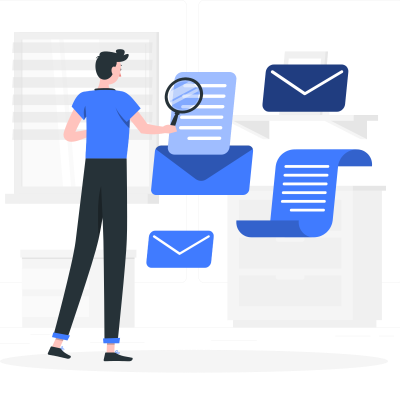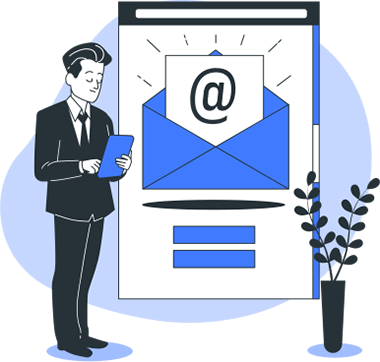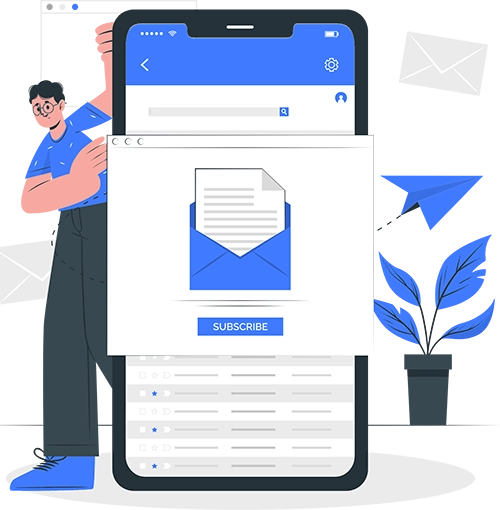B2B Email List – B2B Email Database – B2B Mailing list
What is B2B Email Data?
B2B (Business-to-Business) email data is a comprehensive collection of email addresses and associated contact details of professionals and decision-makers within various businesses. This data forms the backbone of effective B2B marketing and sales strategies.
At its core, B2B email data includes not just email addresses, but also other pertinent information such as names, job titles, phone numbers, company names, industry classifications, and sometimes additional demographic and firmographic details. The primary purpose of this data is to facilitate targeted communication with businesses, helping marketers and sales teams reach the right audience with tailored messages.
Why Should You Use B2B Email Lists?
Using B2B email lists offers a plethora of benefits that can significantly enhance your marketing and sales endeavors. Firstly, it enables targeted marketing. With a curated B2B email list, you can segment your audience based on various criteria.
Get Your Free Samples
This includes industry, job role, company size, and geographic location. This accurate segmentation allows you to tailor your messages to the specific needs and interests of each group, increasing the relevance and effectiveness of your campaigns.
Moreover, buy B2B email lists can improve your lead generation efforts. By having access to a database of potential clients, you can efficiently nurture leads through personalized email campaigns. This not only saves time but also increases the likelihood of converting prospects into paying customers.
Additionally, using B2B email lists can enhance your brand visibility and credibility. Consistent and relevant communication with your target audience helps in establishing your brand as a thought leader in your industry, fostering trust and loyalty among your clients.

How Can I Use a B2B Email Database to Personalize My Email Campaigns?
Personalization is a key factor in the success of any b2b email marketing list campaign. A B2B email database allows you to gather and utilize detailed information about your contacts, enabling you to create highly personalized email campaigns.
Start by segmenting your email list based on specific attributes such as industry, job role, company size, and geographic location. This segmentation allows you to tailor your messages to address the unique challenges and needs of each segment, making your emails more relevant and engaging.
You can create dynamic content that adapts based on the recipient’s profile and behavior. This could include personalized recommendations, targeted offers, and tailored content that speaks directly to the recipient’s interests and needs.
Such personalized approaches not only increase the chances of engagement but also build stronger relationships with your audience, ultimately leading to higher conversion rates and customer loyalty.
Why Opt For Target Access Hub’s B2B Email Lists?
Target Access Hub stands out as a premier provider of B2B email lists, offering unparalleled accuracy, reliability, and comprehensiveness. Our B2B email lists are meticulously curated and regularly updated to ensure that you receive the most current and relevant contact information.
One of the key advantages of choosing Target Access Hub is our commitment to quality. We employ stringent verification processes to ensure that our email lists are free from errors, duplicates, and outdated information. This means you can trust our data to provide you with accurate contact details, allowing you to focus on crafting messages and strategies rather than worrying about the validity of your email list.

Additionally, Target Access Hub offers a wide range of customizable options to suit your specific needs. By opting for Target Access Hub’s B2B email lists, you gain access to high-quality data that empowers your marketing and sales efforts, driving better results and helping you achieve your business goals.

What Are the Different Types of B2B Email Data?
B2B email data can be categorized into various types based on the source and nature of information. Understanding these different types can help you choose the most suitable data for your marketing and sales efforts. One common type of B2B email data is the contact details of key decision-makers.
This includes email addresses, names, job titles, and other relevant information of individuals who hold significant decision-making power within their organizations. Targeting these contacts can be highly effective as they are often the ones who can influence or approve purchases.
Geographic location-based lists categorize contacts based on their physical location. This can be useful if your business operates in specific regions or if you have location-based offers or events. By targeting contacts within a certain geographic area, you can ensure that your messages are relevant and timely.
Company size-based lists categorize contacts based on the size of their company, typically measured by the number of employees or annual revenue. This type of data is useful if your products or services are tailored to businesses of a certain size.
What Are the Sources of B2B Email Data?
One primary source is public records and directories. Many businesses and professionals list their contact information on public directories, industry associations, and company websites. By scraping and compiling this publicly available data, providers can build extensive B2B email databases.
Surveys and online forms are another common source of B2B email data. Businesses can collect contact information by offering valuable content or resources, such as whitepapers, eBooks, or webinars, in exchange for contact details. This method not only helps in building a database but also ensures that the contacts are genuinely interested in the offerings.

Social media platforms are increasingly becoming a source of B2B email data. Many professionals share their contact information on platforms like LinkedIn, where they list their job titles, company details, and sometimes even email addresses. Third-party data providers play a crucial role in sourcing B2B email data. These providers specialize in collecting, verifying, and selling contact information.

What Are the Attributes of B2B Email Data?
B2B email data encompasses various attributes that provide detailed information about each contact. Understanding these attributes can help you utilize the data more effectively for your marketing and sales efforts.
One fundamental attribute is the email address itself, which is the primary means of communication. In addition to the email address, B2B email data often includes the contact’s full name, enabling you to personalize your messages and establish a more personal connection.
Job title is another crucial attribute, as it indicates the contact’s role within their organization. Company name and industry are also important attributes. Knowing the contact’s company and industry allows you to tailor your messages to address industry-specific challenges and opportunities.
Additional attributes may include phone numbers, company size (measured by the number of employees or annual revenue), and specific interests or preferences indicated by the contact. This level of customization can increase the relevance and effectiveness of your campaigns, as it demonstrates your understanding of the contact.
What is B2B Email Data Used For?
B2B email data is a powerful tool used for a variety of marketing and sales purposes. One primary use is lead generation. By having access to a database of potential clients, businesses can reach out to prospects who are likely to be interested in their products or services.
Email marketing campaigns are another significant use of B2B email data. Businesses can use this data to send personalized email campaigns to their audience. Targeted email campaigns, using detailed B2B email data, can achieve higher open rates, click-through rates, and conversion rates compared to generic emails.

Customer relationship management (CRM) is another area where email data plays a big role. Businesses can keep track of their interactions with clients and prospects. Market research and analysis are also facilitated by B2B email data. Businesses can use this data to gain insights into their target market, understand industry trends, and identify potential opportunities.

How It Works – Unlimited B2B Email Database
At Target Access Hub, we offer an unlimited B2B email database that provides updated contact information for your marketing and sales efforts. Our process begins with the collection of data from various reliable sources, including public records, industry directories, trade shows, surveys, and proprietary databases. This ensures that our data is extensive and covers a wide range of industries and job roles.
Once the data is collected, it undergoes a rigorous verification process. We use advanced tools and technologies to verify the accuracy and validity of the contact information. This includes checking for duplicates, outdated information, and errors.
After verification, the data is categorized and segmented based on various attributes such as industry, job role, company size, and geographic location. This segmentation allows you to easily filter and target specific segments of your audience. We regularly update our database to ensure that the contact information remains current and relevant.
This involves continuously monitoring and verifying the data, removing outdated or incorrect information, and adding new contacts. By prioritizing accuracy, we ensure that our clients have access to high-quality B2B email data that enhances their marketing and sales efforts. By leveraging our database, you can enhance your marketing and sales, reach your target audience more effectively, and achieve better results.
Establish Marketing Credibility With An Accurate B2B Email List
An accurate email list ensures that your messages reach the right people. By targeting decision-makers and professionals who are genuinely interested in your products or services, you increase the chances of engagement and conversion.
This targeted approach minimizes the risk of your emails being marked as spam, ensuring that your messages land in the inboxes of potential clients. Consistently delivering relevant and valuable content builds your reputation as a thought leader in your industry, further establishing your marketing credibility.
Moreover, an accurate B2B email list allows you to maintain regular and consistent communication with your audience.

By sending timely updates, industry insights, and personalized offers, you keep your brand top of mind and nurture relationships with your clients. This ongoing communication fosters trust and loyalty, making your audience more likely to choose your products or services over your competitors.

How Accurate Is B2B Email Data?
The accuracy of B2B email data is critical for the success of your marketing and sales efforts. At Target Access Hub, we prioritize the accuracy of our B2B email data through rigorous verification and validation processes. Our data is sourced from credible and reliable sources, including public records, industry directories, trade shows, surveys, and proprietary databases. Each piece of data undergoes multiple levels of verification to ensure its accuracy and validity.
We use advanced tools and technologies to verify the contact information, including email addresses, names, job titles, phone numbers, and company details. This involves checking for duplicates, outdated information, and errors. Our team of data experts also manually verifies the data to ensure its quality. This meticulous process ensures that our B2B email data is accurate, reliable, and up-to-date.
How to Choose a B2B Contact Database?
The accuracy and reliability of the data are crucial considerations. Look for databases that use rigorous verification and validation processes to ensure the accuracy of the contact information. This includes checking for duplicates, outdated information, and errors. High deliverability rates and low bounce rates are indicators of accurate and reliable data.

Customization options are important when choosing a B2B contact database. The ability to filter and segment the data based on specific attributes allows you to create targeted lists that align with your marketing and sales objectives. Customizable options enhance the relevance and effectiveness of your campaigns.

The frequency of updates is another factor to consider. High-quality B2B contact databases are regularly updated to ensure that the contact information remains current and relevant. Outdated or incorrect information can significantly impact the success of your marketing and sales efforts, so it’s important to choose a database that prioritizes regular updates and maintenance.
Pricing is another consideration when choosing a B2B contact database. While cost should not be the sole determinant, it’s important to choose a database that offers competitive pricing for high-quality data. Assessing the value for money and comparing pricing options can help you make an informed decision.
B2B Mailing List That Fits Your Business Needs
To create a mailing list that aligns with your objectives, start by identifying your target audience. This involves understanding the industries, job roles, company sizes, and geographic locations that are most relevant to your products or services.
Data quality is also important when creating a B2B mailing list. Ensure that the contact information is accurate, reliable, and up-to-date. High-quality data minimizes the risk of your emails being marked as spam and increases the chances of your messages reaching the intended recipients.

Use the detailed information in your database to create personalized messages that resonate with your audience. This could include addressing the recipient by their name, mentioning their company, or referring to their specific role. Personalized emails are more likely to capture the recipient’s attention and drive engagement.
Ensure that the contact information is regularly verified and updated to keep it accurate and relevant. This involves removing outdated or incorrect information and adding new contacts. Regular maintenance helps you maintain a clean and reliable mailing list that delivers the best results.

Customize Your B2B Email List Based On
Customizing your B2B email list based on specific attributes allows you to create highly targeted and effective marketing campaigns. Segmenting your email list based on industry allows you to tailor your messages to address the needs and challenges faced by businesses within that industry.
Job role is another important attribute for customization. By segmenting your email list based on job roles, you can create personalized messages that speak directly to the responsibilities and challenges of each role. Tailoring your messages to specific job roles increases the likelihood of engagement and conversion.
Geographic location is also a valuable attribute for customization. If your business operates in specific regions or if you have location-based offers or events, segmenting your email list based on geographic location ensures that your messages are relevant and timely. This geographic targeting helps you reach the right audience with the right message at the right time.
Interests and preferences indicated by the contacts are valuable for customization. By understanding what your audience is interested in, you can create personalized and relevant content that resonates with them. This could include specific product interests, preferred communication channels, or content preferences.
